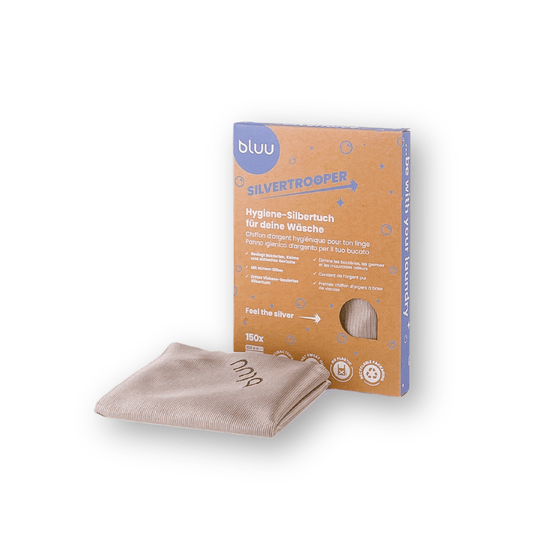New year, new luck? Definitely a good opportunity to rethink old habits and try out new ones. For example, the use of conventional detergent, which is much more harmful to the environment than most people might imagine. We'll tell you why.
The Swiss population does around 220 washes per person per year, which at 100ml of detergent per wash corresponds to around 22 liters of detergent per person. The right detergent is therefore crucial if you want to protect the environment.
Harmful ingredients in detergents
Many ingredients in detergents pollute the environment. Although many are filtered out in the sewage treatment plant, some non-degradable substances enter our waters through the wastewater and cause various types of damage.
The following ingredients in particular are harmful and not recommended.
Preservatives
Many liquid detergents contain preservatives that inhibit the spread of bacteria and thus make the detergent last longer. These biocides are not broken down in the sewage treatment plant and harm microorganisms in the water.
Microplastics and plastic
Microplastics are one of the biggest environmental problems of our time. The smallest plastics and liquid plastics, known as polymers, are used in detergents to reduce discoloration, for example. They enter the environment and oceans almost unfiltered and cause great damage. The consequences for humans are not yet foreseeable.
You can find out more about microplastics in washing on our blog.
Synthetic surfactants
Many detergents rely on synthetic surfactants derived from crude oil or palm oil, a non-renewable and therefore non-ecological raw material. Although only fully biodegradable surfactants may be used in detergents today, degradation products can also be harmful to the environment.
Fragrances
Most detergents have a pleasant, fresh scent. This also has disadvantages: many of the fragrances used are not biodegradable and are toxic to some aquatic organisms.
Fillers
Fillers are used to stretch the detergent, especially in large detergent bottles. They also improve solubility and dosage.
However, fillers have absolutely no influence on the washing effect, but they do have an impact on the environment: they are not filtered in sewage treatment plants, are not biodegradable and lead to salinization of water bodies.
Detergent packaging that ends up in the bin
The packaging in which the detergent is contained also has a very large environmental impact: it is also made of PET, but does not belong in the "normal" PET collection. They have to be disposed of separately. This is why many of these bottles end up in household waste for convenience and are not recycled.

Stain remover, fabric softener and co.
The many aids that are used in addition to detergent have not yet been mentioned, such as fabric softeners or stain removers.
Fabric softener
Here too, the fragrances contained in fabric softeners have a serious impact on the environment because they are not biodegradable and are toxic to aquatic organisms. For soft and smooth laundry without worries, use the bluu Applecadabra washing strips. These contain natural ingredients that make your laundry softer and smoother in a natural way.
Stain remover
Many stain removers are real chemical maces to remove stains as efficiently as possible. Surfactants, fragrances and bleaching agents are often used here too. Our stain soap is free from chemicals and does not harm our planet.
Less is more
Washing is more natural and, above all, much more environmentally friendly.
Our bluu washing strips are easily biodegradable and you can recycle the packaging with your old paper and cardboard. And you can also get rid of stains easily and in an environmentally friendly way with our new stain remover soap.
So if you haven't made the switch yet, it's high time you gave it a try and got rid of your old habits.

You can find out more about sustainable washing on our blog.





